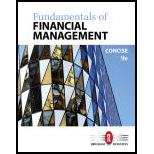
Fundamentals of Financial Management, Concise Edition (MindTap Course List)
9th Edition
ISBN: 9781305635937
Author: Eugene F. Brigham, Joel F. Houston
Publisher: Cengage Learning
expand_more
expand_more
format_list_bulleted
Question
Chapter 6, Problem 7Q
a.
Summary Introduction
To explain: The possibility of the savings and loans has the higher interest rates or not.
Introduction:
Interest Rate: A rate at which a borrower is ready to pay and depositor is ready to receive the money is known as interest rate.
Normal Yield Curve: A yield curve which shows the low yield for the short-term bonds and high yield for the long-term debt is known as normal yield curve.
Inverted Yield Curve: A yield curve which shows the high yield for the short-term bonds and low yield for the long-term debt is known as inverted yield curve.
b.
Summary Introduction
To explain: The beneficial situation between to keep the mortgages or to sell out.
Expert Solution & Answer
Want to see the full answer?
Check out a sample textbook solution
Students have asked these similar questions
Firms require capital to invest in productive opportunities. The best firms with the most profitable opportunities can attract capital away from
inefficient firms with less profitable opportunities. Investors supply firms with capital at a cost called the interest rate. The interest rate that investors
require is determined by several factors, including the availability of production opportunities, the time preference for current consumption, risk, and
inflation.
Suppose the Federal Reserve (the Fed) decides to tighten credit by contracting the money supply. Use the following graph by moving the black X to
show what happens to the equilibrium level of borrowing and the new equilibrium interest rate.
S2
S1
16
D
Equilibrium
INTEREST RATE, r (Percent)
The market for capital
Firms require capital to invest in productive opportunities. The best firms with the most profitable opportunities can attract capital away from inefficient firms with less profitable opportunities. Investors supply firms with capital at a cost called the interest rate. The interest rate that investors require is determined by several factors, including the availability of production opportunities, the time preference for current consumption, risk, and inflation.
Suppose the Federal Reserve (the Fed) decides to tighten credit by contracting the money supply. Use the following graph by moving the black X to show what happens to the equilibrium level of borrowing and the new equilibrium interest rate.
Q1. Which tend to be more volatile, short- or long-term interest rates?
Long-term interest rates
2. Short-term interest rates
Q2. If the inflation rate was 3.20% and the nominal interest rate was 4.20% over the last year, what was the real rate of interest over…
We think of banks as being interest rate intermediaries. That is, the borrow cheaply, and then lend at higher rates, and the spread between those is their profit. But, besides interest rates, what other sorts of risks do banks face?
Chapter 6 Solutions
Fundamentals of Financial Management, Concise Edition (MindTap Course List)
Ch. 6 - Suppose interest rates on residential mortgages of...Ch. 6 - Which fluctuate morelong-term or short-term...Ch. 6 - Suppose you believe that the economy is just...Ch. 6 - Prob. 4QCh. 6 - Suppose a new process was developed that could be...Ch. 6 - Prob. 6QCh. 6 - Prob. 7QCh. 6 - Suppose interest rates on Treasury bonds rose from...Ch. 6 - Prob. 9QCh. 6 - Suppose you have noticed that the slope of the...
Ch. 6 - YIELD CURVES Assume that yields on U.S. Treasury...Ch. 6 - REAL RISK-FREE RATE You read in The Wall Street...Ch. 6 - Prob. 3PCh. 6 - DEFAULT RISK PREMIUM A Treasury bond that matures...Ch. 6 - MATURITY RISK PREMIUM The real risk-free rate is...Ch. 6 - Prob. 6PCh. 6 - EXPECTATIONS THEORY One-year Treasury securities...Ch. 6 - Prob. 8PCh. 6 - EXPECTED INTEREST RATE The real risk-free rate is...Ch. 6 - Prob. 10PCh. 6 - DEFAULT RISK PREMIUM A companys 5-year bonds are...Ch. 6 - Prob. 12PCh. 6 - Prob. 13PCh. 6 - Prob. 14PCh. 6 - Prob. 15PCh. 6 - Prob. 16PCh. 6 - INTEREST RATE PREMIUMS A 5-year Treasury bond has...Ch. 6 - Prob. 18PCh. 6 - Prob. 19PCh. 6 - INTEREST RATE DETERMINATION AND YIELD CURVES a....Ch. 6 - INTEREST RATE DETERMINATION Maria Juarez is a...
Knowledge Booster
Similar questions
- Banks are more likely to create M-1 when the economy is expanding than when it is experiencing a recession. Do you agree or disagree? Why?arrow_forwardAll else being equal, if a central bank buys government bonds from the market it would: a. mean savings in the economy are likely to increase. b. mean the supply of loanable funds would move to the left. c. increase the money supply. d. increase interest rates.arrow_forwardAll else being equal, if a central bank sells government bonds from the market it would: a. decrease the money supply. b. decrease interest rates. c. mean the supply of loanable funds would move to the right. d. most likely decrease savings in the economy.arrow_forward
- 2. If the value of the financial sector is in terms of reducing the individual risk in the economy, how could you measure the value of the financial sector without using information on loan payments (broadly construed to include any interest payment necessary to measure an interest rate or any payment that looks like a return on an investmemt)? If we think of the amount of individual risk remaining after individuals buy portfolios is a measure of the ineffectiveness of the financial sector [or its imperfections], what do you think accounts for these imperfections?arrow_forward3. Consider the monetary neutrality. Suppose that the central bank changed the money supply. According to economists’ assumption on monetary neutrality, could the change affect the employment in the short-run? How about in the long-run? Short-run: Long-run:arrow_forwardWhich of the following is generally the least expensive source of funding? A) demand deposits B) savings deposits C) time deposits D) purchased liabilitiesarrow_forward
- If the Fed buys loans from banks, what is the impact on the Loanable Funds Market? A) Decreases the supply of loanable funds and lowers the interest rate. B) Increases the supply of loanable funds and lowers the interest rate. C) Decreases the supply of loanable funds and raises the interest rate. D) Increases the supply of loanable funds and raises the interest rate.arrow_forward(a) Suppose that the economy of Microland is expanding rabidly. Due to this rapid expansion, the Federal Reserve Bank is pursuing a contractionary monetary policy. Draw clearly labeled graphs for each market (Money market, Goods Market and Investment) to show the effects of this policy on the equilibrium interest rate, investment and output. (b) Suppose that the economy of Macroland is expanding rabidly. Due to this rapid expansion, the Federal Government is pursuing a contractionary fiscal policy. Draw clearly labeled graphs for each market (Money market, Goods Market and Investment) to show the effects of this policy on the equilibrium interest rate, investment and output. Is there any crowding-out due to the contractionary fiscal policy?arrow_forwardDo you think some investors may take advantage of the interest rate reduction, despite economic uncertainties?arrow_forward
- First National Bank has assets that are more rate-sensitive than its liabilities. As interest rates rise, then we should expect the bank profits to: A. Rise B. Fall C. Remain unchangedarrow_forwardYou expect the Central bank to conduct expansionary monetary policy. What will be the impact on the following industries, would you recommend investing in them? : a) Gold mining b) Housing constructionarrow_forwardUnlike other investors, you believe the Fed is going to loosen monetary policy. What would be your recommendations about investments in the following industries?a. Gold miningb. Constructionarrow_forward
arrow_back_ios
SEE MORE QUESTIONS
arrow_forward_ios
Recommended textbooks for you
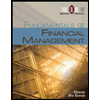 Fundamentals of Financial Management, Concise Edi...FinanceISBN:9781285065137Author:Eugene F. Brigham, Joel F. HoustonPublisher:Cengage Learning
Fundamentals of Financial Management, Concise Edi...FinanceISBN:9781285065137Author:Eugene F. Brigham, Joel F. HoustonPublisher:Cengage Learning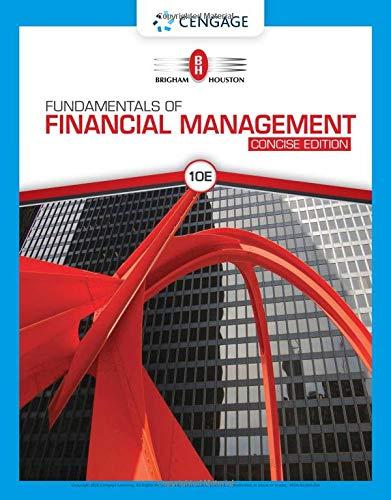 Fundamentals Of Financial Management, Concise Edi...FinanceISBN:9781337902571Author:Eugene F. Brigham, Joel F. HoustonPublisher:Cengage Learning
Fundamentals Of Financial Management, Concise Edi...FinanceISBN:9781337902571Author:Eugene F. Brigham, Joel F. HoustonPublisher:Cengage Learning Fundamentals of Financial Management (MindTap Cou...FinanceISBN:9781337395250Author:Eugene F. Brigham, Joel F. HoustonPublisher:Cengage Learning
Fundamentals of Financial Management (MindTap Cou...FinanceISBN:9781337395250Author:Eugene F. Brigham, Joel F. HoustonPublisher:Cengage Learning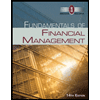 Fundamentals of Financial Management (MindTap Cou...FinanceISBN:9781285867977Author:Eugene F. Brigham, Joel F. HoustonPublisher:Cengage Learning
Fundamentals of Financial Management (MindTap Cou...FinanceISBN:9781285867977Author:Eugene F. Brigham, Joel F. HoustonPublisher:Cengage Learning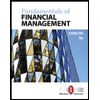 Fundamentals of Financial Management, Concise Edi...FinanceISBN:9781305635937Author:Eugene F. Brigham, Joel F. HoustonPublisher:Cengage Learning
Fundamentals of Financial Management, Concise Edi...FinanceISBN:9781305635937Author:Eugene F. Brigham, Joel F. HoustonPublisher:Cengage Learning

Fundamentals of Financial Management, Concise Edi...
Finance
ISBN:9781285065137
Author:Eugene F. Brigham, Joel F. Houston
Publisher:Cengage Learning

Fundamentals Of Financial Management, Concise Edi...
Finance
ISBN:9781337902571
Author:Eugene F. Brigham, Joel F. Houston
Publisher:Cengage Learning

Fundamentals of Financial Management (MindTap Cou...
Finance
ISBN:9781337395250
Author:Eugene F. Brigham, Joel F. Houston
Publisher:Cengage Learning

Fundamentals of Financial Management (MindTap Cou...
Finance
ISBN:9781285867977
Author:Eugene F. Brigham, Joel F. Houston
Publisher:Cengage Learning

Fundamentals of Financial Management, Concise Edi...
Finance
ISBN:9781305635937
Author:Eugene F. Brigham, Joel F. Houston
Publisher:Cengage Learning